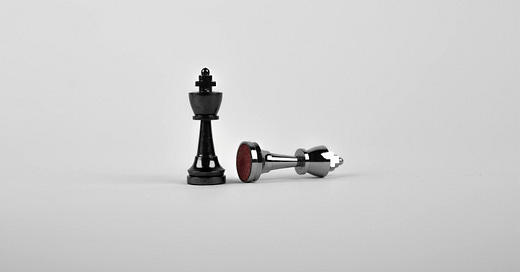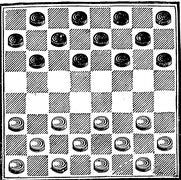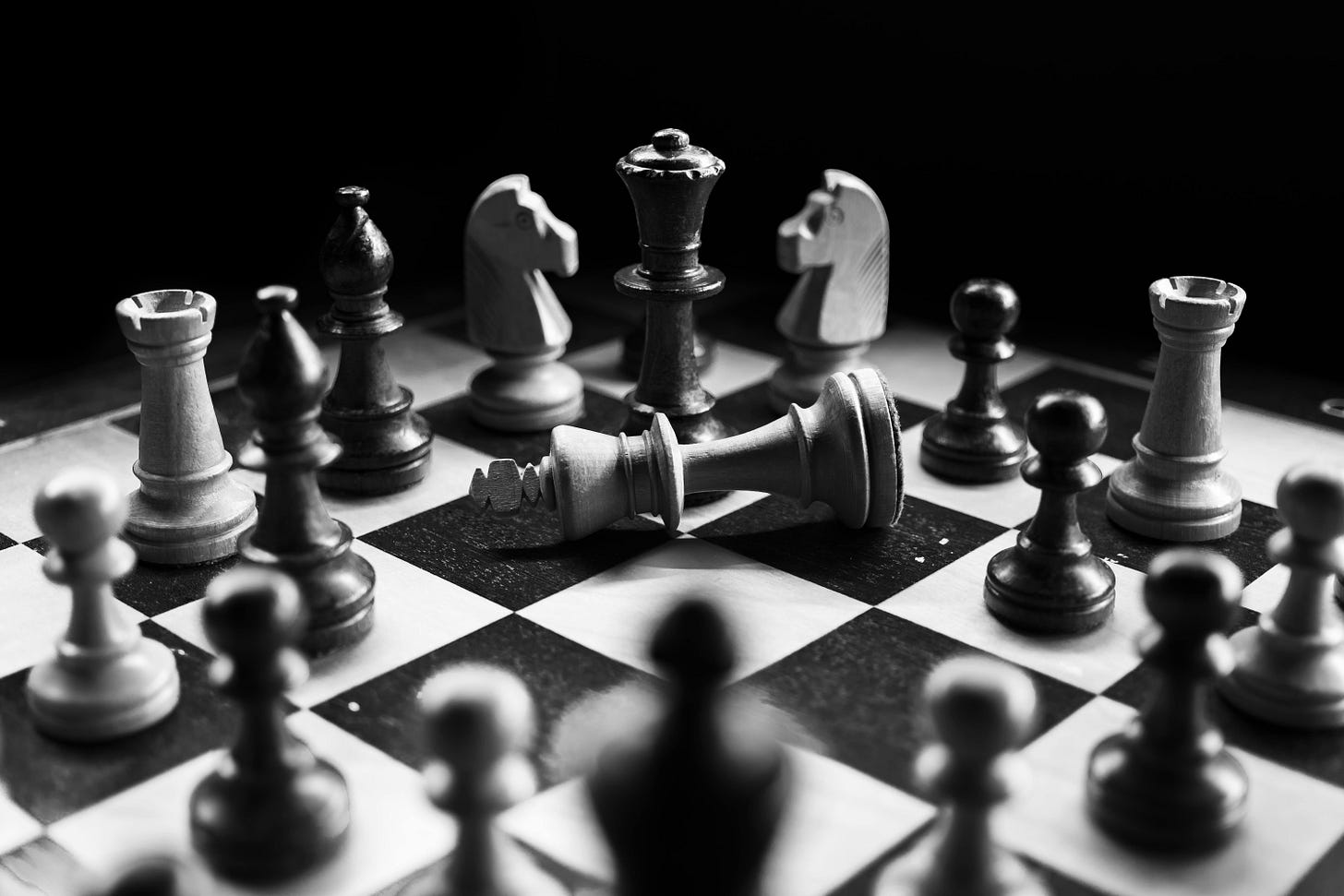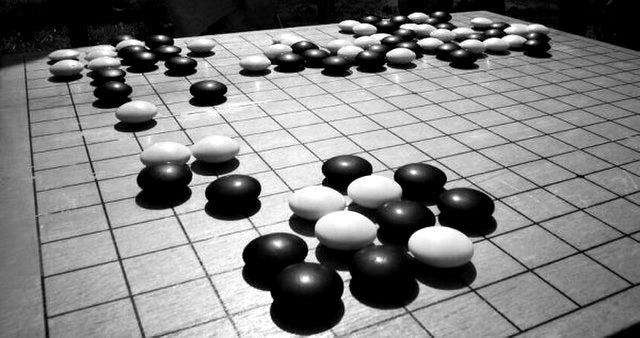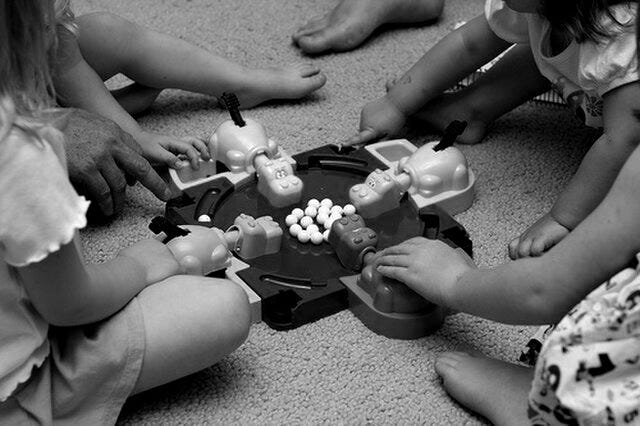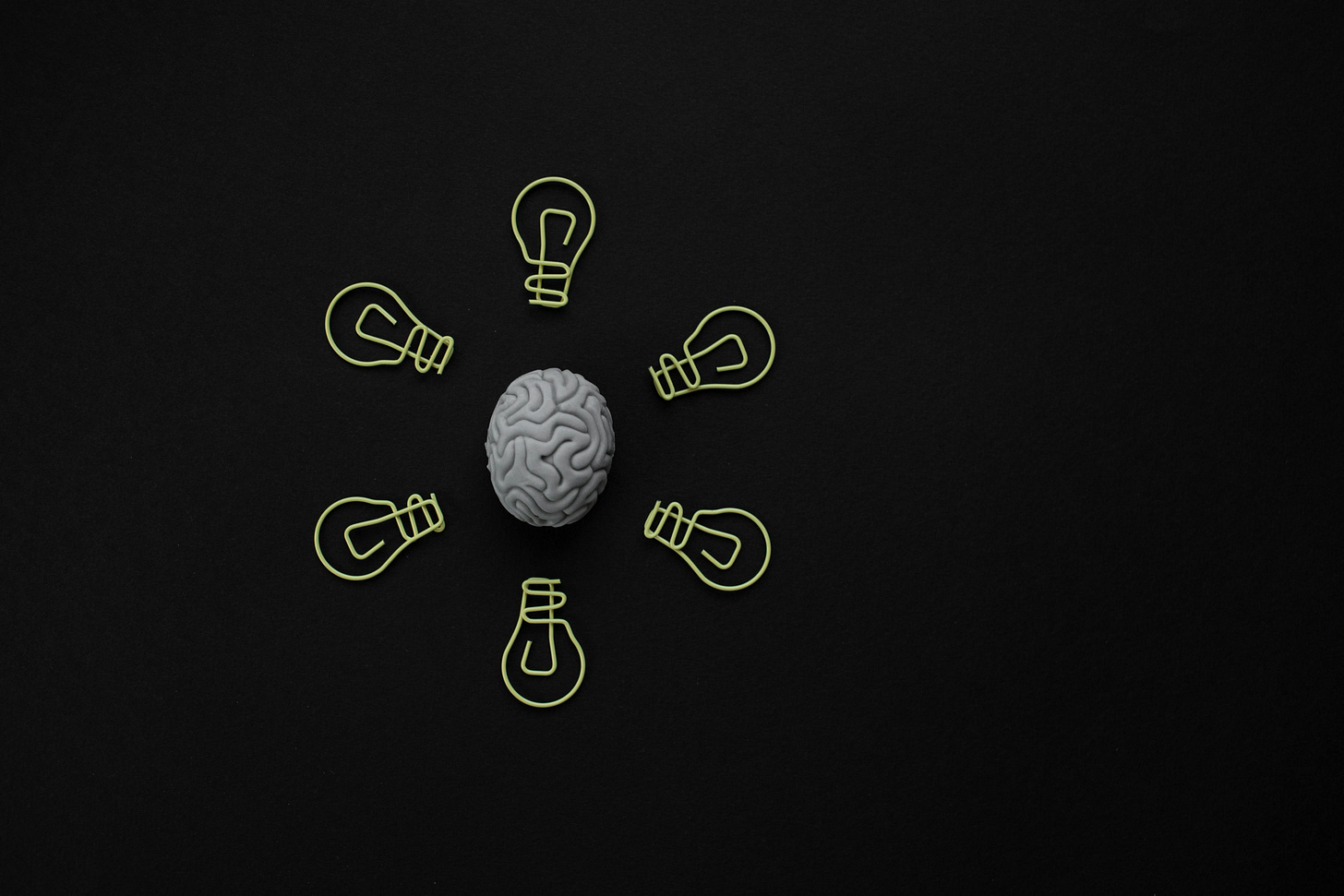Checkers, Chess, Go, and… Hungry Hungry Hippos? The Games We Play with the Future
How Short-Term Wins and Zero-Sum Games Are Failing Us—And What the Ancient Game of Go Reveals About Building a Better World
The future is a game in which we’re all players and the stakes couldn't be higher. Yet a profound disconnect threatens our collective future: we're not all playing the same game. This reality shapes everything from corporate boardrooms to climate policy, from technological innovation to social justice.
Some think in straight lines, some in power move, and some understand that real change is about shaping the board—not merely winning a match. But what happens when players refuse to play by any rules? And then… some aren’t playing a strategy game at all.
If we want a truly regenerative future—one that doesn’t just sustain but restores and reinvents—we need to rethink not only our strategies but the very rules of engagement. Right now, we’re stuck in games rigged for short-term thinking, zero-sum competition and chaotic resource hoarding.
The Checkers Mindset: Linear, Reactive and Short-Term
Checkers is a game of immediate moves. Each piece advances one step at a time along a predictable path, with the sole goal of eliminating opponents as quickly as possible. There’s little complexity or deep maneuvering—just a relentless push for quick wins.
The Tyranny of Short-Term Thinking
This is the mindset of reactionary politics, short-term economic policies and band-aid solutions. It’s the logic of quarterly earnings, election cycles and instant gratification. Governments and corporations that play checkers focus on quick wins and PR platitudes rather than systemic change. They ban plastic straws while oil companies expand drilling, celebrate “record job growth” without addressing wage stagnation, and throw money at crises they helped create, only to repeat the same cycle a few years later.
Real-Life Examples:
Plastic Straw Bans vs. Oil Drilling: In the U.S., local governments have enacted bans on plastic straws—a symbolic gesture aimed at reducing waste. Yet Trump recently re-ordered federal agencies to bring back plastic straws, while fossil fuel industries continue to receive government subsidies, and oil exploration goes unabated.
Corporate Stock Buybacks: Companies like Amazon use profits for stock buybacks and spend millions to prevent unions rather than reinvesting in long-term employee development or sustainable practices, especially as they’ve voluntarily roll-backed DEI. This isn’t just shortsighted—it’s corporate self-cannibalization, devouring tomorrow’s potential for today’s sugar rush. This isn't strategy—it's systematic long-term value destruction while short-term profits soar.
Boeing’s Safety Failures: Boeing cut corners on safety to maximize shareholder value—and now their planes are falling apart mid-air. They fired engineers, ignored warnings and prioritized stock buybacks over human lives. This reckless checkers mindset sacrifices long-term safety and well-being for immediate profit.
The checkers mindset is predictable and easily manipulated. It’s great for those who wish to keep the system simple and the masses distracted, but disastrous when facing complex, interconnected challenges like climate change, economic inequality and social unrest.
The Chess Mindset: Strategic, Competitive, but Still Zero-Sum
Chess represents a more sophisticated but ultimately limited paradigm. Chess is a game of tactics, positioning and calculated sacrifices. Players plan several moves ahead, anticipating threats and formulating counter-moves with precision. It’s a contest of immediate engagement and control. Each move is intended to secure an immediate tactical advantage or capture a key piece.
The Illusion of Control: Zero-Sum Thinking in a Complex World
This is the mindset of interventionist policymaking, geopolitical maneuvering, and corporate dominance. While it demands foresight and strategic planning, its zero-sum nature reflects the limitations of traditional competitive thinking. Nations maneuver for influence, corporations consolidate power, and policymakers make calculated trade-offs while convincing themselves they’re “playing the long game.”
Real-Life Examples:
U.S.-China Trade War: In 2018 in the first Trump administration, the U.S. launched a trade war with China—imposing tariffs to redress trade imbalances and gain leverage over practices the US disagreed with. Both nations maneuver for advantage, yet the resulting economic disruption diminishes collective prosperity. That is playing out now with more fervor— not just with China—but also with Canada and Mexico until they called his bluff.
Big Tech Monopolies: Companies like Google and Meta (Facebook) have perfected the chess mindset by strategically acquiring competitors and maintaining monopolies. For instance, Facebook’s acquisitions of Instagram and WhatsApp helped it consolidate power while stifling potential rivals. A chess move—brilliant, but brittle. When empires optimize for control rather than resilience, they sow the seeds of their own decline.
While chess thinking demands grand strategy and foresight, it is inherently zero-sum—each win is achieved by directly disadvantaging an opponent.
The Go Mindset: Regenerative, Adaptive and Long-Term
Then there is Go (围棋)—a game of patience, spatial awareness and emergent strategy. Unlike checkers and chess, Go isn’t about immediate confrontation. Instead, it’s about shaping the board over time. Players place stones strategically, gradually influencing territory through subtle, indirect moves rather than overt captures. Victory in Go isn’t declared outright—it emerges slowly as the board’s balance shifts.
The Go Paradigm: Embracing Complexity and Emergence
While many games encourage cooperation and long-term strategy, Go represents a fundamentally different approach to strategy. Its genius lies not in strong-armed confrontation but in the patient cultivation of position and influence. Its emphasis on gradually shaping an interconnected board, where even the smallest move contributes to an emergent whole, mirrors how sustainable, regenerative processes work in real life.
Unlike in chess, which is built on direct, immediate tactics where each move is a clear attempt to gain an advantage, Go emphasizes a holistic approach: even the smallest move can gradually transform the overall landscape. Its impact is diffuse and emergent—each move contributes to a vast, interconnected pattern that only reveals its true significance over time.
Other cooperative or strategy games, like Pandemic or Settlers of Catan, do promote collaboration and long-term planning. However, they often come with built-in win conditions or more overt cooperative mechanics that, while valuable, don't capture the subtle, emergent nature of regenerative change as effectively as Go does. Go's unique blend of complexity, nuance, and historical cultural significance makes it a particularly resonant metaphor for building resilient systems that evolve over time.
Real-Life Examples:
Indigenous Land Management Practices: Indigenous peoples worldwide have long practiced sustainable land stewardship, from controlled burns in Australia to sustainable farming in the Andes. Go-thinking isn’t new— it’s ancient. It’s the controlled burn that prevents wildfires, the orchard that feeds seven generations.
Singapore’s Urban Planning: Singapore’s investments in green buildings, water recycling, and public infrastructure illustrate Go-thinking- how seemingly distinct elements can create emergent value through thoughtful interconnection. A city-state playing the long game: where concrete and canopy coexist and every drop of rain is a resource, not waste.
The superiority of Go-thinking becomes evident in addressing complex challenges like climate change. While checkers players debate carbon offsets and chess players negotiate emissions treaties, Go players ask deeper questions: How do we redesign systems to naturally regenerate? How do we create conditions where sustainable practices become inevitable rather than enforced?
The Hungry Hungry Hippos Mindset: Chaotic Greed and Momentary Gluttony
At the extreme opposite of Go's measured wisdom lies the Hungry Hungry Hippos approach, where some companies, administrations and so-called leaders, like the current ones, aren’t playing a strategic game at all. There’s no planning, no foresight; just a frenzied scramble to grab as much as possible before the game ends. Unrestrained greed inevitably leads to systemic collapse.
Real-Life Examples:
Elon Musk’s Agency Breaches: He’s recently made headlines by scrambling to dismantle key oversight agencies—streamlining processes to centralize control and redirect funds into his ventures. This isn’t for efficiency; it’s a Hungry Hungry Hippos grab for power, a desperate dash to dismantle democracy and siphon resources at the expense of public interest as fast as possible, shutting down the agencies like USAID before they could continue their investigations into his wrongdoings.
FTX Collapse: The rapid rise and fall of the FTX cryptocurrency exchange epitomized Hippo-thinking. A $32 billion mirage built on frenzied speculation—proof that gluttony, unchecked, always starves itself in the end.
While Go demands careful planning and respect for systemic interconnections, the Hungry Hungry Hippos mindset epitomizes chaotic self-interest with no regard for long-term consequences or collateral damage.
Thank you for your readership: To further support my efforts and if you’re able to, consider upgrading to a paid subscription for less than a cup of coffee a month. I’m deeply appreciative of your support!
Digging Deeper: The Human Dimension of Our Games
1. The Psychology of the Board: Why Your Brain Might Be Playing the Wrong Game
Evolution equipped us with a Ferrari engine for instant rewards and a bicycle brake for long-term thinking. In today's hyperconnected world, that's a recipe for disaster. Our brains are hardwired for instant gratification, constantly bombarded by 24/7 media, social media dopamine hits and an overwhelming barrage of breaking news. This neurochemical overload nudges us toward chasing quick wins, hijacking our amygdala fear center to keep us in fight or flight states, fueling the checkers and Hungry Hungry Hippos mindsets. We become slaves to the thrill of immediate reward, even when it undermines our long-term well-being.
Your Brain on Short-Term Thinking: A Modern Trap
Stock Market Speculation: Want to see this neurological hijacking in action? Look no further than the GameStop saga. In the high-stakes casino of modern finance, many investors chase meme stocks like GameStop for a quick jackpot. But what happens when the house wins—when the glitter of rapid gains blinds us to the inevitable crash? Millions of investors, intoxicated by the promise of overnight riches, turned the stock market into a virtual casino. The result? A few walked away with fortunes, while others learned an expensive lesson about the difference between gambling and investing. When the music stops, the house always wins—and in this game, we're gambling with our collective future.
2. When Games Collide: Interdependence of All Players
In Go, every stone placed—even the seemingly inconsequential one—ripples through the entire board, altering the fate of the whole system. This isn’t just a game metaphor; it’s a stark warning. Every decision we make sends tremors through our interconnected world. Choose unwisely, and we risk our own future.
The Ripple Effect: Why Your Coffee Choice Changes the World
The Amazon rainforest: Each hectare cleared for quick profit triggers a cascade of consequences: species vanish, carbon bombs tick faster and indigenous knowledge disappears forever. A chess player sees trees to be harvested. Every tree cut is a stone placed on the board of our future—and right now, we're playing a losing game.
A Go master sees the lungs of our planet, understanding that when the Amazon exhales, crops grow in Argentina and rain falls in Texas. The rampant deforestation of the Amazon doesn’t just devastate local communities—it sets off a cascade that accelerates global climate change. A true Go mindset challenges us: What seeds must we plant today to nurture a forest that will outlast us all?
3. The Great Divide: Why Healthcare Shows Our Strategic Blindness
Universal Healthcare: Want to see the stark difference between chess and Go thinking? Look at healthcare systems worldwide. The US plays healthcare like competitive chess, where your access depends on someone else's loss, create expensive, cruel, inefficient systems that fail both rich and poor.
Meanwhile, nations that treat health as a collective resource consistently deliver better outcomes at lower costs. This isn’t mere happenstance—it’s the natural result of systemic, holistic thinking.
This isn't just policy; it's proof that when we stop playing zero-sum games, we can transform scarcity into abundance. The question isn't how to divide the pie; it's how to bake a bigger one that feeds everyone.
4. Cultural Shifts: From Exploitation to Co-Creation
To build a regenerative future, we need a seismic cultural shift—from a paradigm of exploitation to one of co-creation. We must replace the old model of extraction and depletion with one of reciprocity and restoration. The art of cooperation, not competition, will be our greatest asset.
The Revolution of Reciprocity: When Business Meets Biology
The future belongs to companies that think like ecosystems, not empires. Take Interface's journey from carpet maker to climate pioneer. They didn't just green their supply chain—they reinvented their entire business model to mirror nature's circular genius. The result? A company that creates value while regenerating the planet. Or look at Patagonia's bold move to make Earth their only shareholder. That's not charity— it's strategic brilliance that recognizes a fundamental truth: in the long game, business can only thrive when the planet does.
A Call to Transform: Shifting the Game for Our Future
Holistic progress is hard—it demands a deeper, more intricate understanding of the board on which our lives are played. For decades, chess served as the proving ground for AI; Deep Blue’s victory over Garry Kasparov in 1997 was a masterclass in brute-force calculation. Yet it was Go—a game of patience, nuance and emergent strategy—that defied conventional tactics. When AlphaGo’s legendary Move 37 stunned experts, a move that appeared irrational at first, only to unfold as pure genius, it revealed that the most profound strategies are non-linear, measured and visionary. Its vast search space and subtle interplay remind us that our future cannot be secured by short-term, zero-sum tactics. Instead, we must embrace moves that nurture sustainable, holistic, generational regeneration.
Critics might argue that because Go ultimately produces a winner and a loser, it isn’t truly regenerative. But in the game of Go, victory isn’t defined by the final score—it’s defined by the process. Every stone placed is a deliberate act that cultivates balance and resilience on the board. In Go, victory is achieved by gradually creating conditions that sustain long-term balance and resilience. This is TRUE sustainability rather than forcing superficial fixes. The focus is on shaping an interconnected, thriving landscape rather than simply defeating an opponent through direct confrontation. It’s the difference between burning bridges and building networks.
A Call to Strategic Evolution: The choice before us is as clear as it is challenging. We must evolve from:
Reactive responses to proactive system design
Short-term wins to intergenerational value creation
Zero-sum competition to collective prosperity
Resource extraction to regenerative cycles
Remember:
Checkers celebrates the straw ban; Go asks: What river will that plastic pollute in 50 years?
Chess is about control; Go is about influence. One conquers castles; the other plants forests.
Instead of trying to “win” the future by hoarding pieces, we must shape the board so that the right future unfolds naturally. You cannot harvest fruit from a barren tree—the soil must be enriched and deep roots nurtured. Every move should plant a seed that pays dividends for generations.
As we stand at this critical crossroads, the board is set and the stones are in our hands. Will we persist in the frantic scramble for immediate gains, or will we choose to play the long game? A game where every move is a strategic placement that cultivates a landscape of enduring resilience—a game where CEOs invest in 100-year R&D, where voters demand intergenerational policies and where consumers value circularity over waste.
The future is not a single trophy to be won; it’s a vast, dynamic board to be navigated. And it requires every single player navigating the same game. It’s a future where empathy, care, and co-creation replace the cutthroat pursuit of short-term victories.
The real question is: Will we choose to think long-term, sacrifice today for the good of tomorrow, and forge a legacy of lasting transformation?
The board is set. The future awaits its players. Let’s make every move count.
May this vision inspire you to think deeply, act boldly, and join in the creation of a future where we all can thrive.
Bian Li is a regenerative futurist—a visionary who explores how we can design economic and societal systems that restore, rather than deplete, our world. As a leading voice in the "cognitive revolution," she has been at the forefront of reimagining how we think about the future. Since 2016, Bian has lectured and presented globally, advocating for a profound mindset shift as the foundation for transforming the Future of Work, Learning, and Wellbeing. She challenges us to rethink how we approach our greatest challenges, emphasizing that asking better questions is the key to navigating an increasingly complex world. As the nature of work, learning, and human development evolves at breakneck speed, Bian’s insights offer a roadmap for creating systems that are not only resilient but regenerative—ensuring a thriving future for generations to come. 🌱✨

